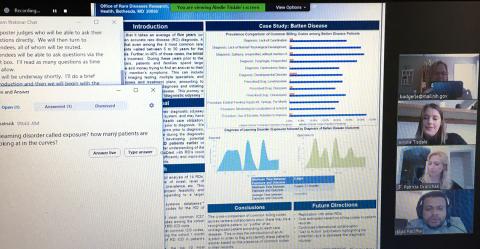NCATS’s Virtual Poster Day May Have Found a New Home Online

The National Center for Advancing Translational Sciences held a very different Postbaccalaureate Poster Day recently, and its organizers think it might be the start of something new. Like the NIH-wide postbac poster day held the following week, this year’s NCATS event went online.
NCATS’s postbac poster events let fellows both share their teams’ findings and gain practice explaining their work. The fellows receive training and mentorship from NCATS scientists as part of the NIH Postbaccalaureate Intramural Research Training Award Program. NCATS also offers career development opportunities that give the trainees research experience, knowledge and skills needed to build the translational science workforce.
In recent years, these postbac events were lively yet crowded—they’ve taken place in a building that houses the NCATS intramural labs in Rockville. Dozens of postbacs would line up by their posters, ready to showcase their research, with their mentors close by.
This year, 21 postbacs participated onscreen through 3 concurrent Zoom sessions, with presentations in 15-minute intervals. One by one, each fellow described a research poster and took questions. Attendees had the option of tuning in to any of the Zoom sessions. Judges and attendees also provided comments.
The format appears to have had many advantages. “We didn’t know what to expect,” said co-organizer Dr. Brittany Haynes of the NCATS Education Branch. “This year’s format seems to have allowed more people to attend and hear presentations in more detail than they might have otherwise in person.”
On virtual display were projects reflecting a range of expertise at NCATS, from new approaches for treating rare diseases to developing drugs that inhibit cancer growth to improving disease modeling.
Here are a few examples:
- Working with NCATS’s Office of Rare Diseases Research, postbac fellow Ainslie Tisdale wants to speed up the pace of diagnosing rare diseases, which often lags for years. She described a project looking at patient health care utilization patterns to develop a system for quickly identifying patient needs.
- Postbac fellow Danielle Davis would like to find better treatment options for dystonia, a group of rare neurological disorders. She and her teammates designed and synthesized a compound for a type of dystonia that will soon be tested further.
- Postbac fellow Alex Renn is working with a team to develop and test “nanobodies,” smaller versions of antibodies made by the body, to defend against invaders such as SARS-CoV-2. Such nanobodies might ultimately play a role in an anti-virus strategy.
Twenty NCATS postbac fellows also participated in the NIH 2020 Virtual Postbac Poster Day. Six postbac fellows, including Renn, received Postbac Poster Awards.
No one knows if an in-person NCATS poster day will be possible next year. Even so, Haynes said the remote format opens up new possibilities, and event organizers may consider using it again.
